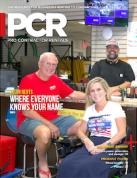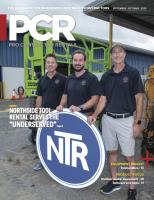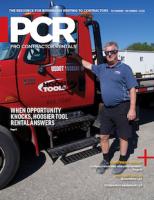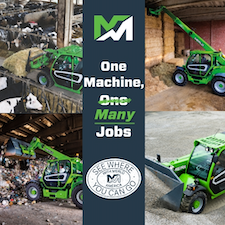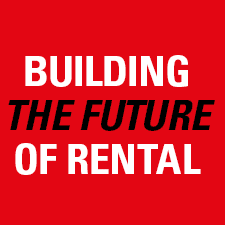Build Your Business - Expand your fleet
When a rental center looks to grow its fleet, the goal is to maximize benefits of increased options and availability for customers while minimizing any additional complexity for the owner.
When Andrea Whelan’s Direct Sales team at JCB talks about the company’s value to rental centers, they pay close attention to both sides of that equation.
On the product side, they outline more than equipment specs. They also share advanced features such as telematics and leading-edge technology in power and design. “At the same time, ease of maintenance and repair and access to service are equally important,” says Whelan, JCB’s vice president of Direct Sales and Service
Make it easy
More equipment doesn’t have to create more complexity in a rental center, Whelan says. For JCB, she highlights the broad range of equipment. “One of the things that appeals to customers is the expanse of our product line. Being able to supply equipment that spans the needs of customers means a rental center can align themselves with fewer strategic partners, effectively streamlining many of their service processes.”
Service and support important
Service is another area that can set a company apart. JCB management understands the importance of service capabilities to its rental customers and has invested substantially in that area. It accomplished this at a time when many companies were cutting back on service and support. While JCB’s primary goal is to have a rental center supported by a JCB dealer, there are areas where there’s not a brick-and-mortar store nearby. In those cases, JCB has service teams that can be deployed to ensure there are no gaps in a service territory. That investment has paid dividends. “It’s been the single biggest needle-mover,” Whelan says.
A robust offering of products simplifies life for a rental center manager and is also key to attracting customers. For example, two years ago, JCB rolled out its access line of boom and scissor lifts and moved into the mobile elevated work platforms arena, furthering its ability to provide rental centers with the full range of equipment customers needed.
Company reputation
Often, new products are built on the back of the reputation that a company builds with its existing line. For JCB, wheel loaders, excavators and other equipment get more use from people familiar with the company’s telescopic handler.
“In the rental space, JCB has historically been well-known for its telescopic handler,” Whelan says. “We get doors to open for us because of the telescopic handler.”
Quality matters. Equipment must be built with the rental market at top of mind. That means sturdy design and simplified maintenance and repair. “People can be rough on rental equipment,” Whelan says, “It is maxed out and put through the paces every single day.”
Telematics and loT
One feature today that improves the experience for both the rental center owner and customer is in telematics, or the Internet of Things (IoT).
While telematics in and of itself is not a new concept, the evolution toward the IoT, which is the extension of internet connectivity to physical devices, and its importance to the equipment industry has become more apparent.
Early adopters of telematics systems were able to become more efficient in keeping up with their equipment’s needs and use basic information such as where a machine is when it is being used, and fuel levels to evaluate efficiencies.
Now, telematics systems, such as JCB LiveLink, can gather more than 100 data points from location and usage to help diagnose preventive maintenance activities. Someone operating a fleet of rental machines can now know how often and how well equipment is being used in many ways and make decisions that immediately help the bottom line. For example, if 10 machines aren’t operating at maximum capacity, those units can send notifications to the fleet managers who can make quick decisions to help those machines reach maximum capacity and enhance productivity.
“It has created efficiencies for customers and that translates into cost savings and overall lower cost of ownership for our rental partners,” Whelan says.
On the service side, advanced telemetrics enables service teams to diagnose problems remotely, so when they arrive to service the equipment, they are better prepared about what to do and have all the necessary parts on hand.
Managing all that data can be overwhelming for some people. Depending on a person’s comfort level, the interface can be adjusted to filter only the data that the individual finds relevant.
“We can make it simple or more comprehensive, depending on what each customer wants or needs to see,” Whelan says.
Always look ahead
Innovation is important in both the retail and rental space, and timing is an important component of innovation. A company wants to be at the forefront of providing new technology, while at the same time keeping an eye on what the market demands today.
“We have to be doing this in conjunction with our customers,” Whelan says. “There’s a necessary balance.” JCB has a strong European heritage. Its presence in European markets means technology developed there can be ready to deploy in the United States when the time is right, and vice versa.
As industries around the world start moving away from fossil-fuel power, that has helped position JCB well in providing alternative energy options for customers. European markets are eager to take advantage of that technology, while the demand in the United States is just now starting to grow. JCB is keeping an eye on the rental space to make sure it can meet demand as it develops.
Alternative fuels
Batteries are first to come to mind in developing alternative fuel technology, and JCB already has a strong presence in the full-electric space in European markets. That technology is now moving to America. However, batteries are not the perfect solution for all applications.
“Batteries are a great solution for some products but create new challenges in others,” Whelan says. “Batteries can be heavy and expensive.”
JCB is developing additional alternatives to diesel fuel, this time in hydrogen power. Whelan says JCB engineers do not want to limit themselves to single options for power. “We’re looking at different ways to deliver that path to zero emissions,” she says.
Another area where years of development will pay dividends is in automation. While customers have often viewed automation as a strategy to improve efficiency, current events have made it necessary as a solution to a more pressing need. Labor shortages across industries have forced businesses to do the same work with fewer hands.
“We know that’s an opportunity,” Whelan says, noting the need for automation to take over repetitive tasks and other areas that have in the past been labor intensive. She is excited about the opportunity and JCB’s role in it.
Thinking about the future is important in every aspect of the rental space. New equipment, new telemetric systems and evolving needs across industries mean that things change quickly. If rental centers are going to keep up with it all, they need the support and management tools to help them. Equipment providers need to own that space. Whelan says that’s where JCB will continue to think creatively.
###
This article originally appeared in the November-December 2021 issue of Pro Contractor Rentals magazine. ©2021 Urbain Communications LLC. All rights reserved.





